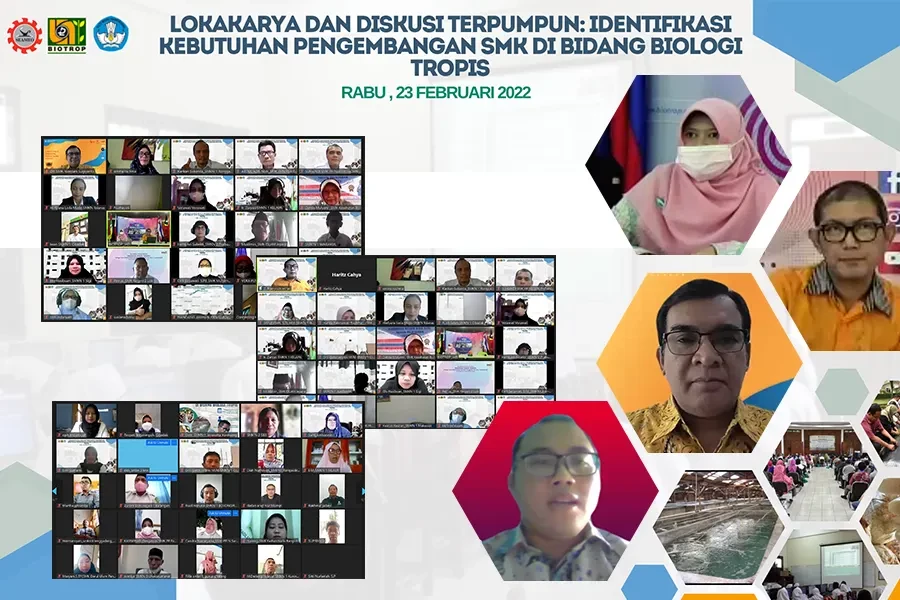To improve the
abilities and competencies of Vocational High Schools graduates that are needed
by the business and the industrial sector, SEAMEO BIOTROP held an activity
“Workshop and Focus Group Discussion: Identification of Vocational High School
Development Needs in the Field of Tropical Biology”. This
activity is carried out online via zoom on February 23, 2022. The purpose of
this activity is to identify problems, potentials, and needs for capacity
building of SMKs, as well as formulate capacity building activities and
collaboration with vocational high schools in Indonesia.
This activity was
divided into two sessions. The first session was held by a workshop and
presenting the resource person including Dr. Wardani Sugiyanto, M.Pd (Director
of Vocational High School, Ministry of Education, Culture, Research and
Technology), Dr. Supriyanto (Affiliate Scientist at SEAMEO BIOTROP), and Riza
Aitiando Pasaribu S.Pi, M.Si (Coordinator of the Commission on Research,
Cooperation and Internationalization, Faculty of Fisheries, IPB University).
Some of the topics presented included: Learning Models and Prototype Curriculum
for vocational capacity building; “Best Practice” SEAMEO BIOTROP's coaching and
collaboration activities with vocational high schools in Indonesia through the
SMARTS-BE Program; Introduction to the Marine Science and Technology Study
Program and the prospects for the Tropical Ocean in Indonesia. The second
session was followed by a focused discussion which was divided into two groups.
This event was
opened by Plt. Bureau of Cooperation and Public Relations (BKHM), Anang
Ristanto, SE., MA. In his opening remarks, he hoped that this activity could be
a medium for improving the quality of education, especially vocational schools
throughout Indonesia, in producing competent, competitive and adaptive
graduates to the demands and needs of business and the industrial sector. This
is in line with what was conveyed by the Director of SEAMEO BIOTROP, Dr.
Zulhamsyah Imran who emphasized the need to improve the quality of graduates
who are ready to work. "To create an independent and highly competitive
vocational high school, it is necessary to conduct a Training Need Analysis
(TNA)," he said. Furthermore, Dr. Zulhamsyah Imran also explained that the
TNA was conducted to find out the competency gap required by business and the
industrial sector and vocational schools in Indonesia, especially in the field
of tropical biology.
Responding to the
TNA analysis, Dr. Wardani Sugiyanto, M.Pd in his speech also explained there
are discrepancy gaps between the curriculum and the needs of business and the
industrial sector, so the project-based learning (PBL) curriculum is needed.
"One of the lack of technological innovation in agriculture, animal
husbandry, and fisheries in vocational schools when faced with industrial-scale
production, so to remove the barriers between subjects and demand drivers, it
is necessary to develop a curriculum based on project-based learning
(PBL)," he stated.
The implementation of this activity is also to support the goal of SDG's No. 4, namely to improve quality education. This activity was attended by 259 participants who are vocational school educators spread throughout Indonesia. (day).
 Wednesday, 23 February 2022 on 10:29am
Wednesday, 23 February 2022 on 10:29am
